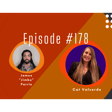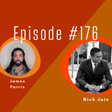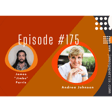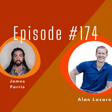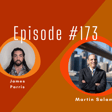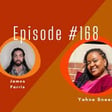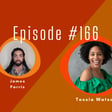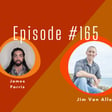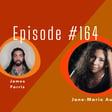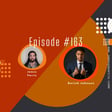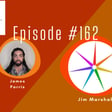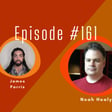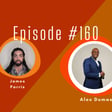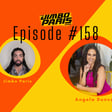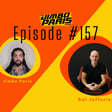Become a Creator today!Start creating today - Share your story with the world!
Start for free
00:00:00
00:00:01

Jimbo Edition #177- Emily Levy
Emily Levy is an expert in the field of education and has helped thousands of children excel academically. She can speak about any education topic, including strategies for academic success, how parents can advocate for their children, best teaching practices, ways to build key academic skills, and many other related topics!
Her website:https://eblcoaching.com/
Watch more here: https://www.jamesgaparris.com/
Transcript
Introduction and Guest Background
00:00:01
jamesparris
All right, hello everyone, welcome back to the show. Today we have another special guest, we have Emily Levy. And again, let's get this started, so how are you doing?
00:00:14
Emily Levy
Doing well. Thank you for having me today. I'm really excited to be here.
00:00:19
jamesparris
All right, so can you begin by telling me who you are, what you're about, and sort of what your message is?
00:00:26
Emily Levy
Absolutely. Well, my name is Dr. Emily Levy. I would say an expert in education, but also the founder and director of EBL Coaching, which is a one-on-one tutoring program based in New York, New Jersey, and nationwide virtually.
00:00:34
jamesparris
Thank
00:00:43
Emily Levy
I received my master's degree in special education, my doctorate degree in general education, and also my undergraduate degree from Brown University. I have a special passion for helping students with special education needs, learning disabilities, ADHD, autism, but really all types of students to help them thrive academically.
00:00:57
jamesparris
you.
00:01:05
jamesparris
Okay, so what is exactly special education?
Understanding Special Education
00:01:11
Emily Levy
Well, special education typically involves students whose brains work differently. They need to be taught in a different way in order to learn effectively. But commonly, it typically is students who have diagnoses like a learning disability, including dyslexia. dyslexia or just graphia or dyscalculia, ADHD, executive functioning challenges, autism, speech and language challenges. These are all kind of examples that fall in that special education category.
00:01:51
jamesparris
or
00:01:52
Emily Levy
It wouldn't, you know, it's interesting because I think that term is becoming more commonly used now than it was historically. But absolutely, that definitely covers sort of these types of students, these types of individuals that I referenced before.
Emily's Journey to Special Education
00:02:10
jamesparris
Okay, and as we continue on with this conversation, can you sort of tell me a bit about where all this passion and interest began? You know, how did this all start out? Like, who were you?
00:02:26
jamesparris
Before you became the woman that you are today on this show right now, you know, how did you sort of develop into this?
00:02:31
Emily Levy
Sure, good question.
00:02:35
Emily Levy
Sure, so I actually grew up in the field of special education. My mother started and ran a school for students with learning disabilities down in South Florida, which is where I grew up. So I really spent so much of my childhood working at her school, listening to her speak on the phone with parents and really being absorbed in that environment.
00:02:56
Emily Levy
But of course, I thought I wanted to carve my own path and do my own thing. So after college, I actually did finance for a few years, which is polar opposite of what I do now. it was a great experience, it was a great learning opportunity. However, I quickly realized it wasn't my passion, it wasn't my calling, and I really at the time reflected back on my time working with children, particularly special needs children, students with learning disabilities,
00:03:22
Emily Levy
and just recalling how rewarding and fulfilling that was. So that was when I kind of pivoted my career trajectory and started working on my master's degree. At the same time, I started personally tutoring students who had various types of learning and attentional challenges.
00:03:39
Emily Levy
and really just organically grew the program. I began working with students out of my little apartment in Union Square, in New York City, and then eventually opened up a small office and then a bigger office and so on. And so just very organically started to bring on other experts, other tutors who specialized in different skill areas and eventually formed what is now EVL coaching. And we have a wonderful, thriving tutoring program where we've been able to help so many students.
00:04:07
jamesparris
Excellent. And so where did this passion derive from? Was it ever a passion?
00:04:17
Emily Levy
It was, I think I didn't realize it from the beginning, probably because I was young. I was in middle school and high school working with children. And then it really was after college when I was in the world of finance, I actually did investment banking and private wealth management. And again,
00:04:34
Emily Levy
realized that that wasn't my passion. It's a great field for many people, but it wasn't my personal passion and my passion was really helping children and helping students thrive. That was when I think I realized what my passion was.
00:04:48
jamesparris
Okay. And more specifically, how do you sort of help children, students sort of
Tutoring Programs and Techniques
00:04:57
jamesparris
thrive? You know, like what what were some of your strategies, some of your go-to methods, or how did you develop them over time?
00:05:04
Emily Levy
Sure. So, um, all of the work that we do in tutoring students is research based and multi sensory so we pull from about 22 different research based techniques in order to create an individualized learning plan for every student.
00:05:19
Emily Levy
Within that, over the years, using these research-based techniques, I've created a series of workbooks that we integrate, we also sell to schools. One is focused on decoding, which is more of the phonetic aspect of reading using what's called the Orton-Gillingham method. I've also developed a multi-sensory math program and then a study skills program that integrates tools like summarizing, reading comprehension, organized writing, and so forth. I've created these tools over time, which is part of but not exclusively what we use when providing the tutoring to students.
00:05:56
jamesparris
Okay, so would that be, again, because I think I've seen forms of this in universities as well. I think they call it assistive technology, assistive tools.
00:06:08
jamesparris
Is that what you're trying to sort of refer to or is it different?
00:06:10
Emily Levy
Well, so assistive technology is typically more software, more computer-based assistance that students receive. For example, a student who has writing difficulties might have a speech-to-tech software program where they can dictate their writing and then the computer types it instead of them having to actually do the physical aspect of typing. So that's an example of assistive technology. Many of the kids that we work with do have assistive technology tools that they use, and if that's the case, then we'll integrate that into the program as needed as well.
00:06:48
jamesparris
Okay. So this specific program, what is it and how does it work?
00:06:55
Emily Levy
Sure, so it's a one-on-one tutoring program. We have two learning centers, one in New York City and one in New Jersey, an angle with New Jersey. And then we do now, for the past six years or so, virtual tutoring worldwide. We have students in Europe and Asia and India, really kind of all over the world, which has been exciting. Typically, the way it works, though, is usually I'll start by doing my own evaluation of a student.
00:07:19
Emily Levy
just to give me an overall picture of their academic skills in reading, writing, math, study skills, any areas that they seem to be having difficulty with. And then from there, I matched that tutor with one of our learning specialists who I feel would be an ideal fit.
00:07:36
Emily Levy
And then at that point, the tutoring sessions begin either again in person at one of our learning centers at the student's home, virtually again on a worldwide basis. And we always use very much of a structured plan of action in helping these students build their academic skills using all research-based techniques that are really customized to their individual needs.
00:08:01
jamesparris
So you mentioned how these tools are customized to the student's individual needs. It's not a lot of work and sort of how would that customization work when you have so many different students?
00:08:14
jamesparris
Do you just take time out of your day doing that for each of them?
00:08:18
Emily Levy
I do.
00:08:19
jamesparris
Okay.
00:08:19
Emily Levy
It is a big part of my role. It is time consuming, but it's so important. I think that there are a lot of tutors out there, and I i know this because yeah I speak to parents all the time, where they might be great at what they do, but they don't necessarily have a plan in place for the tutoring.
00:08:36
Emily Levy
So they might spend some time reading, they might spend some time writing, but there's no structured plan in place. So it's really important, in my opinion, To evaluate the overall profile of the student, what are their specific needs, meaning not just that they need reading help, but what aspect of reading do they need help with? Are they struggling with phonics? If so, is it longer multisyllabic words or is it shorter single syllable words? Are they struggling with spelling, reading comprehension, writing? What is it exactly that they're struggling with and where are they at within each of those skills? And then based on that,
00:09:11
Emily Levy
we come up with a structured plan to specifically target and address those skill areas. So yes, while it is time consuming, it's something that I'm very passionate about and it's something that I know is so critical and so important for the growth of students.
Special vs General Education
00:09:26
jamesparris
Can you maybe provide not and a full on literal instruction or structured plan that you provide for your students, but maybe just a short one or maybe an example so the audience can sort of better understand.
00:09:42
Emily Levy
Sure, yeah, so again, there's a variety of different skills and so many levels, so many needs, but just to give you an example, let's say, for instance, we have a student who is struggling with decoding, meaning sort of sounding out multi-syllabic words, long words, and maybe they also have trouble writing a basic paragraph.
00:10:02
Emily Levy
So what we might do is put together a plan to specifically teach them strategies using a method like the Orton-Gillingham method to teach them rules for how to syllabicate different types of words. And then as we teach each of those rules, we have a system that we follow.
00:10:20
Emily Levy
We might start with a flashcard where we explain the rule and we go over examples. Then we might have some structured workbook exercises that correspond to that rule. And then we might dictate words for them to spell that correspond to that rule. And then moving forward, before we introduce a new rule, we'll always spiral back and refresh to a reminder of those previously taught rules before moving on.
00:10:44
Emily Levy
Now for writing, if they're having difficulty again with structuring a basic paragraph, we might teach them the structure of what is a simple paragraph. Well, a simple paragraph is made up of a topic sentence, three detail sentences, and a conclusion sentence.
00:11:01
Emily Levy
There's different types of paragraphs we can write about again in this structured approach we can write about an example paragraph which gives examples we can write about a process paragraph a a reason paragraph compare contrast so again we would teach them this model of how to write.
00:11:17
Emily Levy
using different topics, different categories that they can write about. And then we might also teach them that when we write, first we brainstorm and then we write and then we self-check our work and we go into tools for how to brainstorm and how to self-check and we give the students lots of practice and repetition in order for them to really grasp these new concepts. So that's just one example of the many, many others that are out there.
00:11:42
jamesparris
So when it comes to learning strategies, for example, flashcards, I think, do you know what sort of spaced repetition is? I think it's a pretty popular flashcard strategy, but I'm not sure. What types of learning approaches do you do with these types of flashcards or how do you sort of teach this stuff to students so that they could sort of understand the information. I think that's the better way of phrasing.
00:12:12
Emily Levy
Yeah, I mean, I think again, it's all about how the student learns and what makes the most sense for that student. Some students do well with flashcards, some like physical flashcards, some like online flashcards with programs like Quizlet. Some prefer web diagrams, more visual diagrams, if they're more creative and more artistic. Some prefer outlines for studying. So there's so many different strategies that are out there and it's really not one size fits all. It's all about let's really try to identify what the best strategies are for this student and then give them lots of practice and repetition utilizing those strategies.
00:12:51
jamesparris
So are you sort of familiar with like the three different types of learners like visual, auditory, kinesthetic, like do you think students sort of fall into those categories? What types of categories would you give to students in a general fashion maybe to make your process of customizing teaching a bit more simpler if you have any or
00:13:16
Emily Levy
Sure. Well, I do think many students do fall into one of those three categories. They might be more visual. Some learn better from an auditory standpoint. Some learn better from a tactile kinesthetic modality. But many students, in fact, often students who have special education learning needs do better with a multi-sensory approach.
00:13:36
Emily Levy
where we integrate those senses simultaneously, not just one or two, but all of those as we teach new lessons. And that's what a lot of research tells us helps these students retain information and really have it stick in their long-term memories.
00:13:53
jamesparris
Hmm. Do you think the same information can be applied to maybe the average student? This is actually another question I have. What do you think makes special education different from the way maybe general education is taught?
00:14:11
Emily Levy
Well, I think that there's a lot of research that continues to be done about that, but I think really it has to do with brain wiring and that certain children just need to be taught in a different way than, say, the neurotypical child who can be taught in maybe more traditional approaches.
00:14:28
Emily Levy
So I think it's really about how information is taught, how information is processed and absorbed. But to answer your question, I do think that many of the strategies that are incredibly effective for special education students are also highly effective for neurotypical, for general education students. It's just that they don't necessarily need that approach in order to excel in school where special education students really do.
00:14:54
jamesparris
I'm really curious, though, could you maybe give like an example of maybe one type of special education process to sort of teach students that might be a bit over the top but could work in a more general sense.
00:15:10
Emily Levy
Sure. Well, one method that is multi-sensory that's incredibly effective and research-based for teaching reading is called the Orton-Gillingham method. I know I've mentioned that a few times. And to give you an example of how that works, now, of course, there's different levels within that methodology, but typically at a very fundamental, foundational level.
00:15:31
Emily Levy
Typically, what's involved is a series of steps for every concept that's introduced. For example, let's say we're introducing the short vowel A to a student. well We want them to know the name of the letter, the sound that corresponds to that letter, and how to form the letter A.
00:15:46
Emily Levy
So what we might do is we might have a flashcard with the letter A on the front and a picture of an alligator on the back. That's our key picture. And we would hold up the flashcard and we would say to the student, this is the letter A like alligator. It makes the sound a. So the teacher would always model it first. Then the student would repeat that with the teacher and then try to do that on their own, typically three times if possible.
00:16:09
Emily Levy
Then we might move on to skywriting. And again, this is where that tactile piece comes in. So as a teacher, I might put my hand in the sky and say, when I write the letter A, I go around, up and down, of course, for the short, the the ah lowercase A. And then the student would do that with me and then we might do that together. And then we might take out a big tray of colored sand or salt or flour. And as the teacher, again, I would model the formation of the letter A.
00:16:36
Emily Levy
And I would say when I write the letter A, I go around, up, and down. And then the student would do it with me in that tray, and then they might do it three times on their own. And then we may do some workbook exercises that correspond to the letter A, and then move on to ah ah another letter. And then typically once we're done with a group of letters, oftentimes four consonants and one short vowels,
00:16:58
Emily Levy
Then we work on how to blend those sounds together to form basic words, and we might use magnetic tiles, we might use flashcards, we might use a whiteboard. So again, we're using the systematic approach, but integrating these multi-sensory tools along the way in order to help students retain the information.
00:17:17
jamesparris
Okay, that's interesting. And can this also be applied to numbers too, or is that a different approach entirely?
Success Stories and Fulfillment
00:17:26
Emily Levy
It is a little bit different. There are aspects of it that can be used in a similar way, like forming the numbers in colored sand. We can form numbers in the sky and speak the formations out loud. And then typically we'll use more objects for counting and for helping students understand what what a number means, what counting means, what addition means. So yes, the same approach can be used and in just a little bit of a different way.
00:17:52
jamesparris
So what types of approaches do you think are your favorite specifically to teach?
00:17:59
Emily Levy
Well, I love the multisensory approach. I'm a believer that it is an approach that can help every student. And students tend to actually enjoy it when instead of just sitting and listening to a teacher, we're bringing in tools like colored sand and magnetic tiles and whiteboards.
00:18:19
Emily Levy
kind of makes it a little more interesting for them. So again, while it works so well for special education students, incredibly effective, it also works really well for ah ah neurotypical students as well. So that's really my favorite approach to teaching.
00:18:35
jamesparris
Do you have a least favored approach to teaching?
00:18:40
Emily Levy
And the reason why I say that is because, again, I think it goes back to every student being different. And even though I might not like a way that a teacher might teach me, that doesn't mean it's not effective for other students. So I think, again, it goes back to really figuring out what works best for each student and then jumping in on that and using that approach to build success for that student.
00:19:04
jamesparris
So speaking of success for that student, what are some of your best student success stories? Now, obviously, you don't need to mention any names or anything personal, but maybe just scenarios with them involved that you like.
00:19:18
Emily Levy
Sure. Well, one story that really kind of warms my heart is that back in the day, about 20 years ago, to make me feel old, I was tutoring students myself and had this one boy who was in, I believe, first grade at the time, had severe ADHD and severe dyslexia, could not read a single word. And it was a struggle to really teach him how to read.
00:19:40
Emily Levy
But I did it. I worked with him for a long time, for many years. And then i I I stopped as he got older. And his mom actually reached out to me not that long ago to say that not only did he successfully graduate high school and graduate college, but he went to graduate school for engineering and is working as an engineer right now. Again, it just warms my heart when I hear these stories of kids that struggled so much in school, but with the right support, made it through successfully, made it through college, and are are are thriving in life. I mean, that's really kind of, I think, one of the reasons why I do this kind of work for those types of stories and outcomes.
00:20:17
jamesparris
What do you find the most fulfilling about your work?
00:20:20
Emily Levy
really being able to help children and change their lives and see them from being anxious, sad, not doing well in school. A lot of them have these sort of mental health kinds of challenges that go along with the learning challenges. They're used to negativity, to failure, and really turning that around and using a positive approach, building success, building their academic skills, and in turn building their self-confidence as well. I think really that turnaround is something that I'm just so incredibly passionate about.
00:20:54
jamesparris
so so when it comes to sort of building that self-confidence, how could you tell the best between a student that has a lot of confidence versus one that doesn't have a lot of confidence in their learning ability?
00:21:07
Emily Levy
Well, I think it's usually, honestly, about the way they speak about themselves. Usually ones that have poor confidence say things like, I can't do this. I'll never be able to do this. I'm bad at this. She's or he is better at me than this. So it's a lot of those negative kinds of words. And then what we'll do is,
00:21:26
Emily Levy
as we see a student build their skills. For instance, let's say when we start with them, they can only write one basic sentence, but after six months, they're writing well-written paragraphs. Well, we show them that work and we say, rather than these empty praises, let's take a look at what you were doing six months ago compared to what you're doing now. You should be amazed at the growth in your work. You should feel so proud with how far you come And this is proof right here. So it's really giving them ah ah a tangible reason to feel good about themselves. And as we do that, we really start to see their self-talk change become more positive, more confident, and their whole demeanor a lot of times will really change for the better.
00:22:07
jamesparris
You know what I find interesting? Students in traditional education, at least in my time in college, had these same negative self-talk beliefs, but at the same time they didn't really have the access like, you know, these students do with you to that positive, you know, affirmative kind of, okay, look at how you're doing in the past now to see how you're doing now. and I kind of have a hunch that maybe that teaching that you gave that student, also the mindset as a whole may have impacted him and helped him to do better too in a sense. Don't you think so as well?
00:22:44
Emily Levy
Definitely. I think the way that we speak to ourselves, the way that the image that we feel, we portray, I think all of that is connected to success. So I think, and I think confidence, self-confidence is such a key part of that.
00:22:58
jamesparris
So just more about you, were you ever in special education by any chance?
00:23:04
Emily Levy
I was not. I actually was a fairly good student growing up. I always did well. But for me, it was just really spending so much time at my mother's school, again, listening to her speak to parents, observing kids, working with kids. That was really my ah ah connection to the world of special education. That was my foundation. And it was for many, many years that I was in that world before doing it professionally on my own.
00:23:31
jamesparris
Did you ever have any fears or any concerns before getting into special education? Were there any impacts or changes you felt needed to occur because you didn't feel comfortable in that?
00:23:47
Emily Levy
Well, I think that there's a fear associated with anything in life. When I left the world of finance and jumped into education, I didn't really know if I would make it. I didn't know what next chapter would be. But I think for me, it was a lot of just taking something from every experience and learning as I went and constantly looking for knowledge.
00:24:05
Emily Levy
learning from people, going to school, absorbing information through every chapter and never really giving up on learning. Always having that open mind to new opportunities, new experiences, new ways of helping children that I think has helped me grow along the way.
00:24:21
jamesparris
Interesting.
Professional Development and Future Plans
00:24:22
jamesparris
So what specific, I think I should have phrased that question better. So what specific issues do you think are occurring in special education maybe before you got in or now and changes that you would like to make in it or have made in it to kind of address them?
00:24:40
Emily Levy
Well, I would say that many teachers, even after graduate school, after getting a master's degree, are kind of thrown into the classroom. They don't all necessarily have tools for how to go about teaching children in a systematic way, especially those who have special education needs. So I think that there needs to be more professional development that is specific to concrete tools and strategies for how to help these types of children in ways that are really effective. And I think that's something many schools, many districts are starting to do that, but I think a lot more of that has to really happen in order to help these special education students thrive.
00:25:25
jamesparris
So that a lot more, what is that a lot more?
00:25:28
Emily Levy
I think just more frequent professional development, more consistent professional development, follow up on professional development. I think more of that needs to happen.
00:25:40
jamesparris
So what do you think is sort of the future of your career And again, let's talk a bit about what you do now, sort of your business and sort of the services and products you might be pushing.
00:25:52
Emily Levy
Sure, so our specialty is one-on-one tutoring. Again, in-person, virtual. We help all types of kids as young as pre-K. We go all the way up through the adult level. So again, every student has different needs and we always individualize our tutoring to what's best for each student. Like I mentioned earlier, we've really had the opportunity to expand our tutoring to beyond just the New York, New Jersey area, but to help kids all over the country and all over the world, especially those who may not have access to this kind of specialized research-based multi-sensory tutoring that just may not exist in their geographic area and they just might not have access to it. So
00:26:33
Emily Levy
It's been really exciting to be able to expand that. I hope to continue doing that, to continue helping more and more children and really helping them thrive as they move through school academically.
00:26:45
jamesparris
Excellent. And sort of when it comes to sort of a lot of the services you provide, what shocked me the most, and I think you could tell by my face, was you actually provided services to adults. So is that a common thing for these institutes to provide services to adults too?
00:27:08
Emily Levy
It's less common. I would say more of what we do is kind of pre-kated grade 12, but with adults, we work with many adults who have, and they have all different kinds of needs. Some might have dyslexia that was never really properly addressed when they were younger and it's affecting them in the workplace and they need help with reading.
00:27:26
Emily Levy
We have adults who really need help with writing. They can't compose an e-mail regardless of what their career is. We all need to know how to write and to communicate, so we help all adults with that. We help adults who need work on what we call executive functioning skills or skills like organization, time management, planning. There's so many different kinds of needs. Again, I would say it's less of what we do, but still a good part, and I think there are many adults that need this kind of support as well.
00:27:54
jamesparris
Excellent. And this has been an amazing interview. And I'm just curious though, if you could go back in time and maybe speak to your younger self, right? What would you say to her exactly?
00:28:07
Emily Levy
Well, it's funny because I have daughters and I think about what to say to them. But I think I would say, just have an open mind. Don't be so firmly committed to one path because you never know what life is going to bring. You never know when you're going to need to pivot or change your career path or just tweak your life plan a little bit. And I think that's something that I didn't necessarily anticipate doing, but I've pivoted along the way. And in looking back, it's worked out really nicely for me, and I'm happy that I had that open mind. And I think I would encourage my daughters to do the same thing as they grow up, because I think it's really important to be flexible and to have that open mind as you progress through life.
00:28:52
jamesparris
All right. Well, again, thank you for being on the show. Are there any sort of final closing words you'd like to get to the audience before I let you off here?
00:29:01
Emily Levy
Well, first off, it's been such a pleasure. I've really enjoyed this conversation. If anyone's interested in learning more about our tutoring program, reading any of the articles that I've written, is EBLcoaching.com. E like Edward, B like Boy, L like Larry. And then we also have Facebook, Instagram, and TikTok channels also under EBLcoaching.
00:29:23
jamesparris
All right, well, thank you again for watching the show. I will see you all next time.
